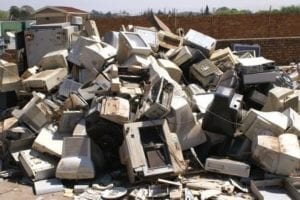A National e-Waste Conference and Exhibition was held in Nairobi, Kenya, to identify solutions to Kenya’s mounting e-waste problem. The conference focused on the potential economic and environmental benefits of the responsible management of e-waste and provided a platform for stakeholders to discuss ways to reduce the hazards arising from the disposal of electronic equipment in Kenya.
Electronic waste is now Kenya’s fastest growing waste component. The United Nations Environment Programme (UNEP) estimates that over 17 000 tonnes of electronic waste is generated in Kenya annually. This is equivalent to 130 million mobile phones. At Dandora, a 30 acre unrestricted dumping ground just 8 kilometres from Nairobi, 2 000 tonnes of new waste arrive per day. These include heavy metals such as lead and mercury often found in e-waste. A UNEP study of 300 schoolchildren near Dandora found that approximately 50% of them had respiratory problems, and 30% had blood abnormalities signalling heavy-metal poisoning.Finding ways to improve e-waste management has become a priority for the Kenyan government. The National Environment Management Authority (NEMA) of Kenya has already developed draft E-Waste Management Regulations, which, when gazetted, will provide an appropriate legal and institutional framework and mechanisms for the handling, collection, transportation, recycling and safe disposal of e-waste.
UN Under-Secretary-General and Executive Director of UNEP Achim Steiner explained that sustainable management of e-waste can combat poverty and generate green jobs through recycling, collection and processing of e-waste, and safeguard the environment and human health from the hazards posed by rising levels of waste electronics. “Smart public policies, creative financial incentives and technology transfer can turn e-waste from a challenge into an important resource for sustainable development.” Dr. Faridah Were, Senior Research Scientist at KIRDI said, “We are confident that this conference will not only play its part in raising awareness about the threats posed by e-waste but also highlight the huge economic opportunities it represents in terms of recycling.”






